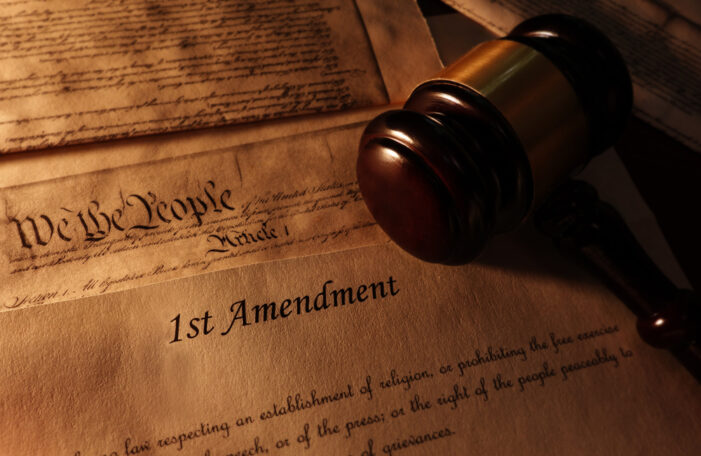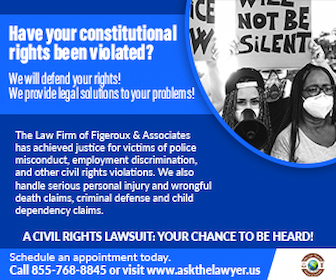By Linda Nwoke
In recent years, the once widely admired American democratic system has faced escalating concerns over its decline. A significant factor contributing to this apprehension is the intensifying political polarization between the Democrats and Republicans, hindering effective governance and eroding public trust in the government. The situation on both ends of the political spectrum is exacerbated by the surge in extremist groups and increased incidents of violence and hate speech.
The rise of social media has also contributed to the proliferation of misinformation and disinformation, and the decline of traditional news outlets has undermined trust in institutions and deepened societal divisions. The widening economic inequality gap has also increased resentment and frustration among various population segments. At the same time, attempts to restrict voting rights, particularly in Republican-controlled states, have sparked widespread criticism as a direct threat to democracy.
All these factors have collectively fostered a growing perception that American democracy is on a downward trajectory. Some experts are even sounding alarms, warning of an imminent constitutional crisis that could further escalate the challenges faced by the United States in preserving its democratic ideals.
It was the basis of one of those gatherings involving experts organized by Ethnic Media Services. Associate Editor Pilar Marrero introduced a series titled “American Democracy in Decline.” The series explored concerns surrounding the state of American democracy as the nation approaches the 2024 presidential elections, emphasizing the potential for a ‘constitutional crisis, as used in media and public discourse.
What is a Constitutional Crisis?
It describes a situation whereby the government cannot function effectively because of disagreements over the interpretation of the Constitution, leading to violence and a breakdown in law and order. One of the experts, Seth Masket, Department of Political Science, Director of the Center for American Politics at the University of Denver, outlined four distinct types of constitutional crises with historical examples and contemporary relevance. In his description, a constitutional crisis consists of four major components: uncertainty in constitutional provisions, constitutional ambiguity, institutional failure, and political infeasibility despite constitutional guidance.
Some examples include, “Where the Constitution itself is unclear about the government. In the 1850s, it was unclear whether the federal government could regulate or eliminate slavery in states. We ended up having a civil war to answer that question.”
Citing another example, he said, “A third type of crisis is where institutions fail. We might think of a government shutdown along those lines.”
His explanations stress the multifaceted nature of constitutional crises and recall the numerous constitutional crises in American history, including the Civil War and the Watergate scandal. However, other experts believe America’s current situation is more dangerous than any previous crisis.
Defining Constitutional Crisis from Legal Perspectives
Professor Hawk from the University of Chicago explained the concept of constitutional crisis from a legal perspective. He noted the nuanced ways lawyers and legal scholars use the phrase, which differs from other definitions. According to Professor Hawk, legal circles acknowledge the inherent gaps and ambiguities within the Constitution, which is not necessarily a crisis.
“I think that lawyers tend to be very aware that the Constitution, like almost any written law, has lots of gaps, issues, or questions that it either just doesn’t answer or offers an ambiguous answer and points in two directions simultaneously.”
He further distinguished between prolonged constitutional issues and what lawyers consider a crisis: “I sense that when lawyers or law professors talk about a constitutional crisis, what they mean is something sudden and acute, a heart attack rather than a long-standing condition of hypertension, where some or all systems of government break down,” says Professor Hawk.
Additionally, Professor Hawk reiterated that different definitions arise based on the number of government systems considered critical and the extent to which they are perceived to be breaking down. “So, for some people, the prospect of a government shutdown is a constitutional crisis. Yet other people would say, Well, you don’t have a crisis until the entire system of governance under the Constitution is at the point of breaking.”
Additionally, Professor Hawk proposed another perspective by evaluating whether the purpose of the Constitution, such as installing national democracy, is jeopardized.
Role of Political Parties and the Constitution’s Limitations
Irrespective of the definition, the experts discussed the various causes of the problem. According to Masket, it goes beyond the Constitution. In his view, the political parties play a significant role in the crisis. “The problem isn’t necessarily with the Constitution, as political parties fill some of the void left. That has been a fairly useful adaptation where parties help political actors coordinate across different parts of the federal government.”
Masket emphasized that the Constitution did not anticipate parties nominating candidates who could threaten democracy, such as presidential eligibility, which did not include prohibitions against felons or individuals currently in prison. Parties would nominate suitable candidates. Masket highlighted the contemporary challenge where parties have set candidates facing legal issues.
“There’s a couple of court cases right now about whether Donald Trump should be allowed to be on the ballot due to his participation in the actions on January 6th, 2021; the 14th amendment to the Constitution prohibits people who have taken part in an insurrection against the United States from serving in office,” says Masket.
Concerns About Upcoming Elections
In response to concerns about the upcoming elections and a potential presidential candidate facing legal issues, Gloria J. Browne-Marshall, Professor of Constitutional Law, John Jay College (CUNY), emphasized the unique nature of the situation. Professor Browne-Marshall pointed out that the Constitution explicitly addresses insurrection but does not specifically speak to other criminal offenses. She noted that individuals with criminal records, including those in prison, have run for various positions in society, including the presidency, if they meet the essential criteria and financial requirements.
“The Constitution specifically speaks to insurrection. It doesn’t speak to any other criminal offense, and other people have run for office from prison with criminal records,” says Professor Browne-Marshal.
However, the concern arises due to the insurrection provision triggered in the case. The expert highlighted the potential seriousness of the situation, stating that there’s a real possibility that the person in question could win, causing a convergence of constitutional provisions and political implications. “So, I think those two things come together to cause somewhat of a political crisis,” says Browne-Marshall
Reactions to the Current Political Events
Professor Aziz Z. Huq, Scholar of United States and Comparative Constitutional Law, University of Chicago Law School, highlighted the unique challenges posed by the candidacy of former President Donald Trump, who is a likely candidate facing criminal charges related to the subversion of the democratic process. The professor reiterated the gravity of the situation, where the indictments involve efforts to hinder the lawful counting of votes and demonstrate a willingness to misuse political authority to eliminate rivals and entrench power. Huq noted that this scenario, though observed in other fragile democracies, lacks an exact parallel in American history.
“We have a distinctive situation. We have something that I think is observed in other democracies, especially fragile ones around the world, but doesn’t have an exact parallel in American history,” says Professor Huq.
Furthermore, he expressed concern about the need for critical political players to commit to democracy, underscoring that even a well-designed system won’t work without such dedication. He noted the importance of a political system being responsive to changes in public opinion.
He was referring to an interview with Donald Trump, where he openly discussed the potential use of the Department of Justice to prosecute his enemies, highlighting a tendency to initiate actions perceived as anti-democratic.
In reaction, Professor Masket acknowledged the unconventional nature of Trump’s statements and the potential consequences for democracy in 2025. Professor Masket reflected on historical instances, particularly in 2016, where a candidate promising actions undermining democracy or the Constitution did not necessarily lose voter support.
“Well, one thing from 2016 is that a candidate promising to do things that undermine democracy or the Constitution or even do those things in office doesn’t necessarily move many voters against him. It is not necessarily a vote killer,” he said.
He highlighted the challenges of relying on voters to screen out anti-democratic behavior, noting that safeguards such as the impeachment process and the role of political parties should serve as checks on such conduct.
Professor Masket stressed the importance of distinguishing between the Constitution and democracy, noting that the Constitution is not inherently a democratic document. Professor Masket suggested that some of the threats posed by the candidate in question may be directed toward democracy rather than the Constitution itself. “And I think, you know, there are some things that Trump is threatening that may be more of a threat to democracy than to the Constitution itself.
Signs of Decline in American Democracy
Responding to the question about signs of decline in American democracy, the experts referenced history. For instance, reflecting on her African-American heritage, Professor Browne-Marshall highlighted the historical struggles of marginalized communities over voting rights. She noted the significance of the African-American experience as a plausible definition of a constitutional crisis due to its long-standing history.
She questioned the narrative that constitutional crises are only recognized when they impact the rights of the middle class or white Americans, pointing out the historical oversight in defining constitutional crises and urging a broader perspective that encompasses the struggles of marginalized communities.
“But now, it becomes a constitutional crisis when it starts to undermine the rights of the middle class and the rights of white Americans; all of a sudden, we’re debating the constitutional crisis,” she said.
Professor Masket acknowledged the fragility of multiracial democracy in the United States. He noted that the country has only functioned as such since around 1965, emphasizing its relatively recent establishment. He suggested that the perception of fragility arises from the country’s history and the challenges of building a functioning multiracial democracy.” And, you know, arguably, this country has only really been a functioning multiracial democracy since roughly 1965.”
The professor knocked the recent trend where candidates, particularly Republicans, claim fraud after losing elections. He noted that, unlike typical post-election claims that tend to fade away, sustained assertions of fraud by candidates like Donald Trump contribute to the erosion of democratic norms. He expressed concerns over a party’s unwillingness to accept defeat, as it threatens democracy.
The expert asserted that “a functional democracy relies on the understanding that losing parties will have another opportunity to compete.”


